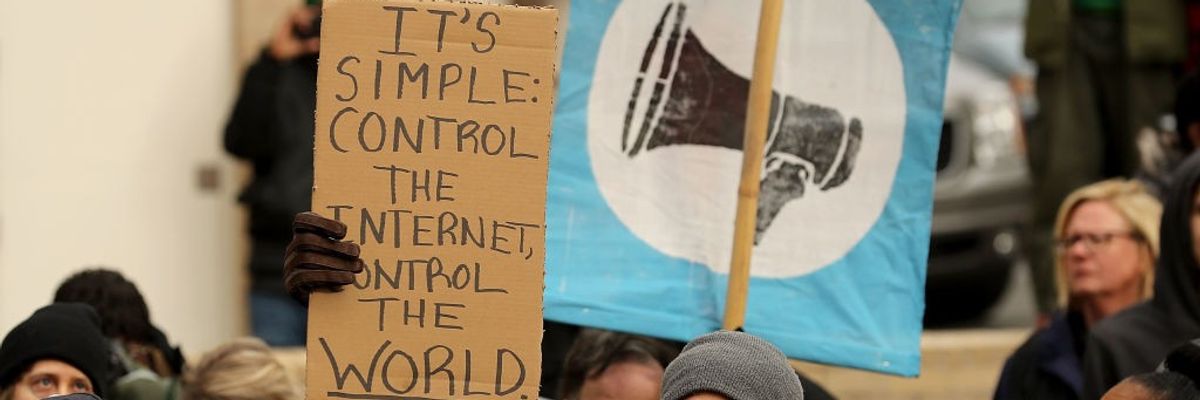Happy New Year to everyone but the U.S. Court of Appeals for the 6th Circuit.
On Thursday, this federal court in Cincinnati threw out the Federal Communication Commission’s Net Neutrality rules, rejecting the agency’s authority to protect broadband consumers and handing phone and cable companies a major victory just weeks before the Trump administration returns to power.
The ruling against the FCC by three Republican judges isn’t shocking, but their reasoning is shoddy, a mish-mash of tired industry claims paired with a willful misrepresentation of how the internet actually works.
As Matt Wood, an experienced telecommunications attorney and my colleague at Free Press, explains: “Beyond being a disappointing outcome, the 6th Circuit’s opinion is just plainly wrong at every level of analysis. The decision missed the point on everything from its granular textual analysis and understanding of the broader statutory context, to the court’s view of the legislative and agency history, all the way to its conception of Congress’s overarching policy concerns.”
Our job now is to channel the growing outrage over this appalling decision into the long-term changes we need to keep the internet safe, reliable, accessible, affordable and free from unlawful discrimination.
Under the leadership of Chairwoman Jessica Rosenworcel, the FCC moved in April 2024 to restore Net Neutrality and the essential consumer protections that rest under Title II of the Communications Act, which had been gutted under the first Trump administration. This was an all-too-rare example in Washington of a government agency doing what it’s supposed to do: Listening to the public and taking their side against the powerful companies that for far too long have captured and called the shots in D.C.
And the phone and cable industry did what they always do when the FCC does anything good or important: They sued to overturn the rules.
This time, however, the lawyers for the biggest phone and cable companies had two things working in their favor. First, they got lucky: They won the forum-shopping lottery and got their case moved outside of Washington, D.C., where previous rounds of the Net Neutrality fight had been decided.
Second, the Supreme Court handed down a ruling in June in the Loper Bright Enterprises vs. Raimondo case that overturned the so-called Chevron doctrine that gave deference to expert agencies in complex matters like environmental and telecommunications regulations.
Unfortunately, the lawyers representing massive companies like AT&T, Comcast and Verizon found an eager audience in Cincinnati for their debunked arguments.
Despite extensive legal and economic analysis provided by Free Press and our allies in the case and at oral arguments in October, the court ruled against the FCC and deemed internet access to be an “information service” largely free from FCC oversight.
In a post-Chevron world where courts no longer have to defer to expert agencies, we’ve replaced years of evidence and argument with revelations like this from Judge Griffin: “The existence of a fact or thought in one’s mind is not ‘information’ like 0s and 1s used by computers.”
In the short term, this decision will let the incoming Trump FCC abdicate its responsibility to protect internet users so it can focus on its new priority of threatening TV broadcasters and social-media sites to carry more pro-Trump views.
I’ll spare you the rest. This court’s warped decision scraps the common-sense rules the FCC restored in April. The result is that throughout most of the country, the most essential communications service of this century will be operating without any real government oversight, with no one to step in when companies rip you off or slow down your service.
This ruling is far out of step with the views of the American public, who overwhelmingly support real Net Neutrality and despise the cable companies. They’re tired of paying too much, and they hate being spied on when they surf (or talk, thanks Siri). Now they’ll have even less recourse to deal with unscrupulous and abusive business practices.
Incoming FCC Chair Brendan Carr and his old boss Ajit Pai, who’s part of the Trump transition team, are crowing everywhere about the decision and cheering this strike against “regulatory overreach.” Of course, Carr and his ilk have never been interested in protecting the public interest, only private profits.
In the short term, this decision will let the incoming Trump FCC abdicate its responsibility to protect internet users so it can focus on its new priority of threatening TV broadcasters and social-media sites to carry more pro-Trump views. The hypocrisy of crushing light-touch regulations while aggressively pursuing government censorship is something to behold.
In the weeks ahead, the FCC, as well as Free Press and the other parties who intervened in the case, will consider our legal options and decide whether to appeal the case to the Supreme Court. In Congress, we’ll start laying the groundwork for a future bill that restores Net Neutrality and FCC authority. Meanwhile, we’ll look to the states to hold the line, with laws like California’s strong Net Neutrality regulations thankfully still on the books.
Our job now is to channel the growing outrage over this appalling decision into the long-term changes we need to keep the internet safe, reliable, accessible, affordable and free from unlawful discrimination.
It may have gotten harder, but the fight for the free and open internet is far from over.
